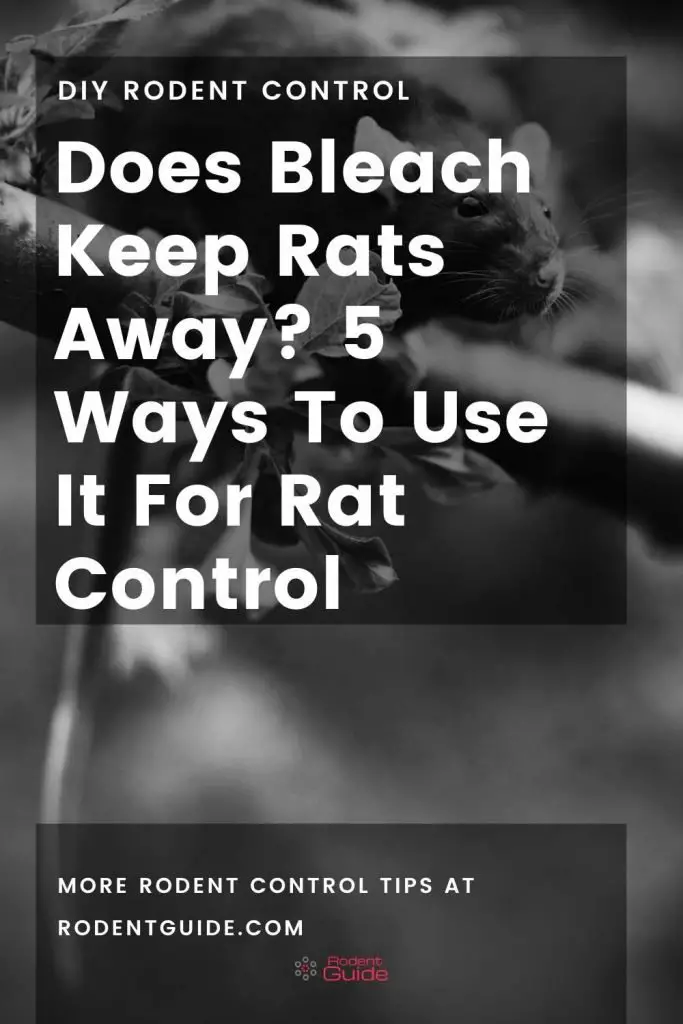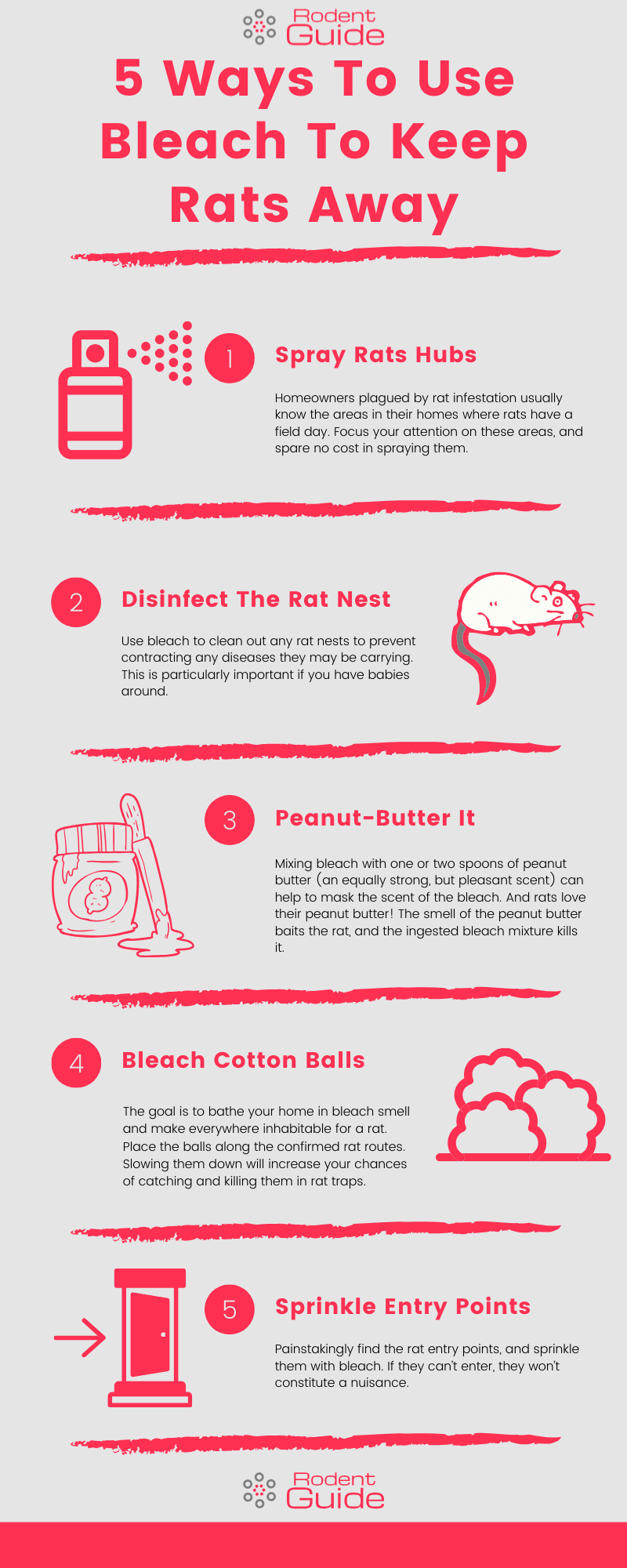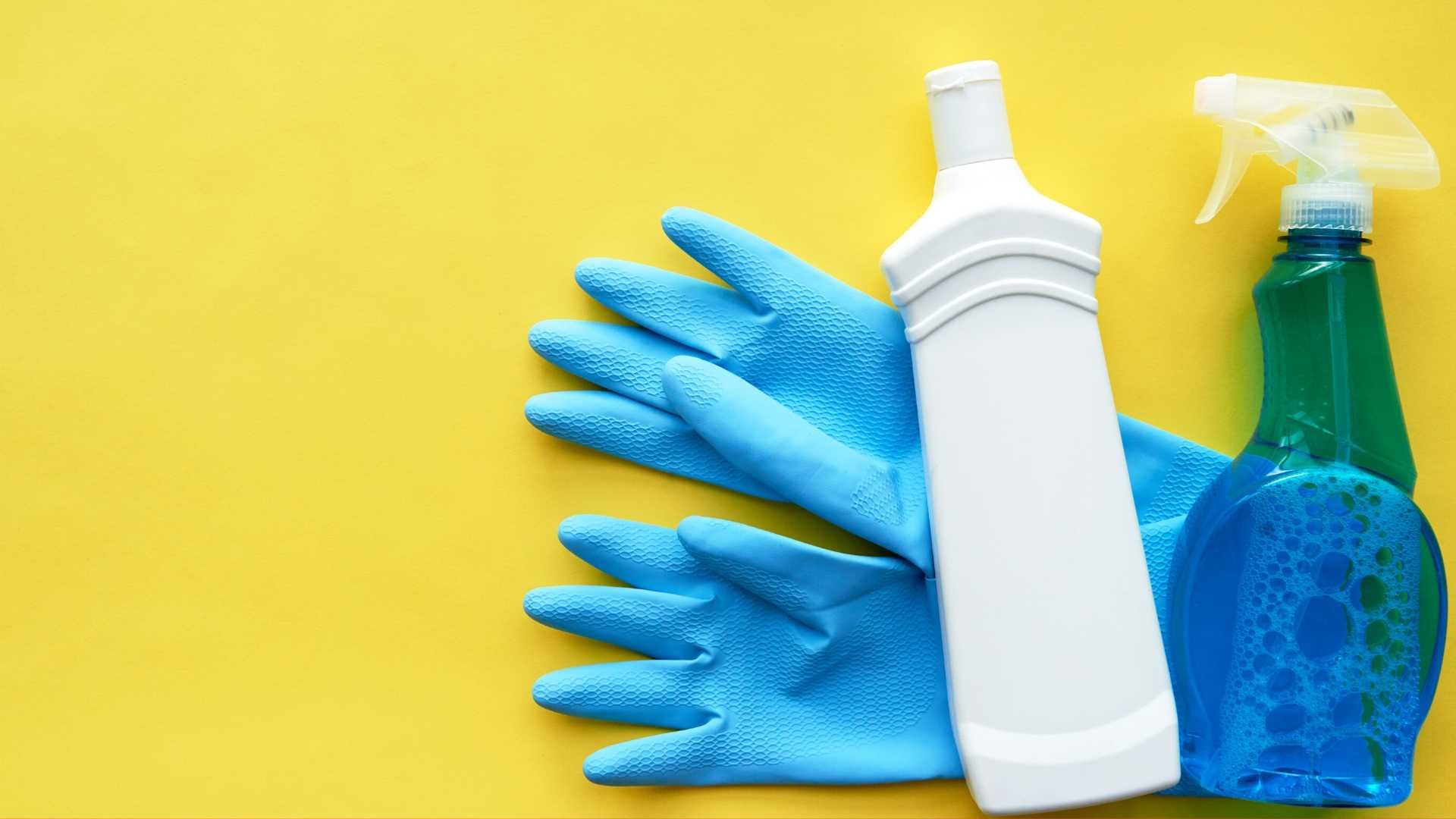Getting rats in your home spells trouble!
They ruin your possessions, risk your health, and leave a trail of destruction wherever they have been.
You are probably already tempted to lay down many rat traps to get rid of the problem, but is that enough? Is there anything you can do to repel them?
We already know that bleach repels mice, but does bleach keep rats away too? So let’s take a look.
What you will learn in this post:
- Does bleach keep rats away?
- Does bleach kill rats?
- How to use it to keep rats away

How Does Bleach Keep Rats Away?
Bleach is the generic name for any chemical that removes stains. It could be solid or liquid and is used in dry-cleaning white garments.
It is also used in textile industries to whiten otherwise colored fabrics in the same vein.
If you’ve handled bleach before, you’d know it has a characteristically irritable odor. Humans have a degree of tolerance to this odor (the only reason we can use it).
Rats simply do not like the odor!
Rats make up for poor eyesight with their impeccable sense of smell. Now, it makes sense that you bait rats with cheese and other foods with pleasant smells.
Bleach, meanwhile, has a strong, undesirable smell. If you can bait rats with pleasant scents, you can repel them with unpleasant smells, which means using bleach for rats is a good idea.
To recap: Does bleach keep rats away? Yes, it does!
Can Bleach Kill Rats, Or Deter Them?
Bleach is a caustic agent with a pungent smell. Prolonged exposure to the bleach stench could be harmful even to the strongest humans.
If ordinary exposure could cause such harm as internal bleeding and decreased oxygen consumption, be sure that direct contact will cause much more damage.
Hence, depending on what you want to achieve, you can use bleach as a repellant and a poison for rats.
Bleach makes an excellent rat repellant because of its smell; however, it can equally act as a deadly poison to rats when used in particular ways.
It can kill them!
A rat cannot simply ingest bleach and live to tell the story.
5 Ways To Use Bleach To Keep Rats Away
Since bleach has a strong odor, getting rats close enough to harm them is usually tricky. There are several ways to mask the smell and get the rats to ingest it.
Whether it’s about repelling rats or killing them, the idea is to keep them away from your home!
Bleach won’t keep rats away when it’s sitting pretty on your shelf. There are several ways to use bleach to chase rats away from your home.
These five ways are the most common and have proven to be the most effective.

1. Generously Spray Rats Hubs in your Home
Homeowners plagued by rat infestation usually know the areas in their homes where rats have a field day.
Focus your attention on these areas, and spare no cost in spraying them. Keep the exits to these areas open.
Allow the rats to escape once they’ve sniffed in enough bleach.
Since it’s not like you’d be spending the night with your family at hotels during this period, we suggest that you dilute the bleach solution very well.
Locate the areas within your home that continuously buzz with rat activity. When you think you’ve sprayed enough in these areas, we advise you to sprinkle some more!
Remember to leave the exits open to help drive them away.
2. Disinfect The Rat Nest
Bleach is an equally strong disinfectant. Once applied to surfaces, it kills all present bacteria and viruses.
Beyond the nuisance they cause, rats are also vectors for diseases like hantavirus and leptospirosis. Even the rat urine and droppings are heavily infested with disease-causing organisms.
Use the bleach solution to clean out any rat nests to prevent contracting any diseases they may be carrying. This is particularly important if you have babies around.
Use the bleach solution to clean out any rat nests to prevent contracting any diseases they may be carrying. This is particularly important if you have babies around.
Do not sweep or vacuum these areas, as this only spreads these organisms around your home. Carefully clean with bleach and water, using protective gear like gloves and a respirator.
Mop your floors, and every suspected area rats may have contacted.
While we are on rat nests, you will also need to check your yard for rat burrows. If you find any, you should pour bleach down the rat hole entrances to the burrows.
3. Peanut-Butter It
If you want to harness the power of bleach in rat control ingeniously, be prepared to waste some peanut butter. Remember how pungent the smell of bleach is?
It is impossible to get the rats close enough to the bleach to kill them if they can smell it from a mile away. All they’ll do is avoid that part of your house.
Mixing it with one or two spoons of peanut butter (an equally strong but pleasant scent) can help mask the bleach’s strong smell. And rats love their peanut butter!
The smell of the peanut butter baits the rodent, and the ingested bleach mixture kills it.
Once in contact with the rat’s stomach, it burns its walls even as it causes its epithelial cells to disintegrate. Once extensive damage has been wrought on the stomach, related tissues and organs are also affected.
The rat dies in about 1-2 days.
4. Bleach Cotton Balls
Peradventure rats have a haphazard distribution around your home. With no centralized areas of activity, bleach-soaked cotton balls will come in handy.
Upon soaking cotton balls in bleach, distribute them all about your home in no organized manner.
The goal is to bathe your home in bleach smell and make everywhere inhabitable for a rat. Place the balls along the confirmed rodent routes. Slowing them down will increase your chances of catching and killing them in rat traps.
Decorate your home in cotton balls soaked in bleach, and observe the encounters with rats plummet in around only a week.
Does bleach keep rats away? Yes – when you soak cotton balls in it!
5. Sprinkle Entry Points
It is common knowledge that a space that can fit a rat’s head is all the space it needs to enter your home.
Common entry points include cable holes, air conditioning vents, door gaps, and windows, to name a few.
Painstakingly find the rat entry points, and sprinkle them with bleach. If they can’t enter, they won’t constitute a nuisance.
Physically seal the rat’s entry point.
Double the resistance by generously sprinkling dilute bleach around these areas.
Will Bleach Get Rid Of Rats?
Ok, so we have answered the question ‘Does bleach keep rats away?’ and the answer is yes, it will help!
As with many things that require a strong scent, bleach is not useful in open areas, such as your yard, under your deck, or garden.
The biggest and the best thing you can do to keep rats away from your home is to seal up those entry points. If a rat cannot get in, then you will not get any rats in your home! Simple.
How does the effectiveness of bleach as a rat repellent compare to other common repellents?
Bleach can be effective as a rat repellent due to its strong smell, which rats dislike. However, its effectiveness compared to other methods like ultrasonic devices or natural repellents varies. Ultrasonic devices work by emitting sounds rats find unpleasant, while natural repellents use scents from essential oils or plants. Each method has its advantages and suitability depending on the environment and the severity of the rat problem.
Are there any safety concerns for pets or children when using bleach in the suggested methods?
Yes, there are safety concerns when using bleach around pets and children. Bleach is a powerful chemical that can be harmful if ingested, inhaled, or if it comes into contact with skin. When using bleach as a repellent, it’s important to ensure that it’s applied in areas not accessible to pets and children and to follow safety instructions for handling and dilution.
How frequently should the bleach solutions be reapplied to maintain their repellent effect?
The frequency of reapplication for bleach solutions to maintain their repellent effect depends on various factors such as the area being treated and environmental conditions like rain, which can wash away the solution. It’s generally advisable to monitor the treated areas and reapply as the smell diminishes, which could be anywhere from a few days to a couple of weeks. Regularly assessing the situation and adjusting the frequency of application as needed can help maintain effectiveness.
Conclusion
Does bleach keep rats away? Yes – it does keep rats away! Does bleach kill rats? It does, but only if you can get them to consume it, which is no easy task due to the strong scent of bleach.
Why call an exterminator when you have something in your laundry room that you can use?
Follow the five methods we have outlined, and use bleach to keep rats away from your home, or at least help to keep them away!
A quick word just before you go. At the beginning of this post, I mentioned that bleach is an agent used to make clothes white again. That means bleach strips color from material and other substances.
Keep that in mind as you go through your house spraying bleach to deter rats! Read the instructions on the bleach, and do not spray it on materials you shouldn’t spray it on.
Finally, if you are looking for a more natural option, I suggest you go for a vinegar rat repellent instead.
Good luck!








will this work in the garden as well as i have been over run for the last 3 years it seems to be an on going problem